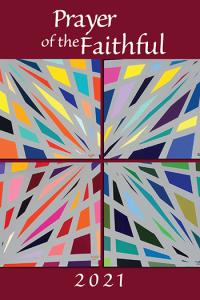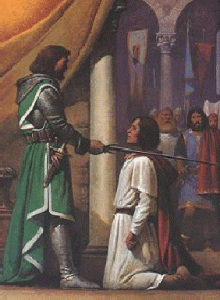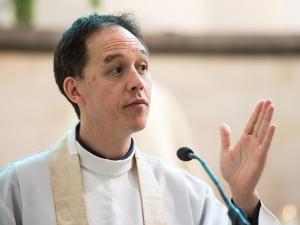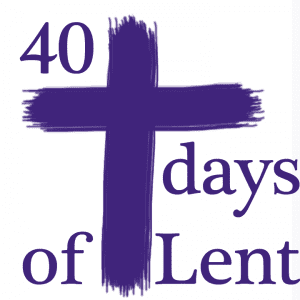
I notice something odd about the Prayer of the Faithful that I hear at Sunday Masses. Many of the petitions don’t ask God to do anything. Liturgical Press is a resource for which I have great respect and even a passing relationship. In 2004 they published my book Read the Way You Talk: A Guide for Lectors. They also publish annually a helpful resource for people like me who compose their parish’s Prayer of the Faithful. It’s called Living Liturgy: Spirituality, Celebratioin, and Catechesis for Sundays and Solemnities. Oregon Catholic Press offers another good resource with their Prayer of the Faithful. Of course, the prayers will be more meaningful if the community’s own concerns enter into the Sunday petitions.
I just have one complaint about both of the sources I mentioned. It’s about whom we are asking to do something.
Who should answer a Prayer of the Faithful?
Here are two typical prayer suggestions for the Fourth Sunday of Easter. The first is from Liturgical Press, the second from Oregon Catholic Press.
- For all who serve as shepherds to the people of God, emulating the life of Christ may they serve with humility, gathering the scattered and protecting the weak …
- That governments carefully guard the safety and quality of food and water …
Each petition ends, “Let us pray to the Lord.” So we know that we’re praying to God. But up to that point it’s hard to tell. It looks like we’re asking Church or government leaders to do something. In each case it’s something one would wish for. But a prayer of petition should ask God to do something.
This week I chose to use these same ideas, but I modified and added to them thus:
- For our Holy Father, Pope Francis, and for all the shepherds who tend the Lord’s flock; for us also, for the grace to be servants to each other in imitation of Jesus, the Good Shepherd …
- For honesty and integrity in government and a spirit of responsible leadership in the areas of affordable housing and safe food and water …
Adding the words “grace” and “spirit” makes it clear that we’re asking for things that God gives.
The passive voice, judiciously used, also can indicate that we are looking for an action of God’s. Here are two more prayers from the two sources, Oregon Catholic Press first this time.
- That young people preparing for confirmation and graduation [may] be strengthened for a life of loving service through the anointing of the Holy Spirit …
- For all gathered here, may we be freed from anxieties and needless worry, resting secure in the arms of the Good Shepherd …
Talk to God in the body of the prayer.
It can get awkward if every petition in the Prayer of the Faithful specifies that the action is from God or the Holy Spirit or the Good Shepherd, but often that’s not necessary:
- For a renewal of trust between communities and law enforcement officials …
- That loved ones who are sick or in need of comfort may be brought back to health and a lively spirit …
These prayers don’t say that God is acting, but it’s obvious enough. That’s especially so if you make one more change. I have tried to make the whole Prayer of the Faithful, not just when the people say, Lord, hear our prayer,” talk to God. I do that by not placing God in what our grammars call the third person.
When a prayer ends with “Let us pray to the Lord,” it refers to God (third person) but it’s not talking to God (second person). Instead the reader is addressing the assembly, whose answer, then, talks to God: “Lord, hear our prayer.”
I like what some parishes have done. Instead of “Let us pray to the Lord,” they end each petition with a simple, “We pray.” Better would be to add, “God, we pray.” Then it’s clear that the whole prayer is addressed to God. You can also put “God” in the middle of the prayer, like this:
- As the adventure of space exploration proceeds, God, give us eyes to see the awesome wonders of the created universe and the fragile beauty of our planet home, we pray.
These are two ways that I think the Prayer of the Faithful can be a bit more prayerful. What do you think?












